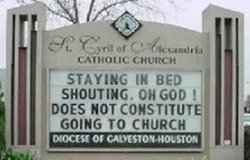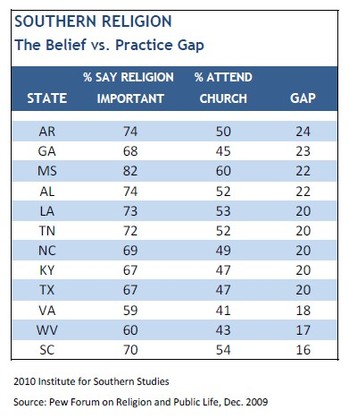FAIR WEATHER FAITH? Southerners are religious, but how many actually go to church?
 What makes people religious: How important faith is in their lives, or how often they actually attend services?
What makes people religious: How important faith is in their lives, or how often they actually attend services?According to the Pew Forum on Religion and Public Life, there's a big difference between the two, even in Bible Belt states in the South.
Last month, Pew ranked all 50 states by their "religiousness," using four different measures (importance of religion to those being surveyed, worship attendance, frequency of prayer and belief in God).
Unsurprisingly, Southern states ranked high. In all 13* Southern states the Institute and Facing South follow, the people surveyed scored above the national average in each category.
But by using four different lenses on what it means to be "religious," the survey revealed some interesting discrepancies.
For example: The difference between the percentage of people who say "religion is very important in their lives" and those who "attend religious services at least once a week."
By my calculations, there's roughly a 20-point difference between the two in South. I compiled a chart that breaks it down by state:

As you can see, the gap is largest in Arkansas and the smallest in South Carolina.
There are lots of reasons people who view themselves as "religious" might decide to skip going to services, ranging from frustration with a local minister/priest or sheer laziness, to broader reservations about the direction of their denomination or organized religion in general.
It also might reflect something I wrote about last year: The significant decline of people who identify as Protestant Christians -- long the backbone of Southern religion -- in the South. Between 1990 and 2008, the number of people who identified as Protestant Christians dropped in every Southern state except Louisiana; in nine Southern states the drop was 10% or more.
An interesting area for further study would be the impact this has on politics. These Protestant denominations are the driving force behind the religious right in the South, and the church itself is the organizing platform. Will this decline in the number of people who identify with these denominations -- and the large number of Southerners who don't attend church -- affect the ability of fundamentalists to mobilize come election time?
* The 13 Southern states the Institute follows are Alabama, Arkansas, Florida, Georgia, Kentucky, Louisiana, Mississippi, North Carolina, South Carolina, Tennessee, Texas, Virginia and West Virginia.
Tags
Chris Kromm
Chris Kromm is executive director of the Institute for Southern Studies and publisher of the Institute's online magazine, Facing South.
